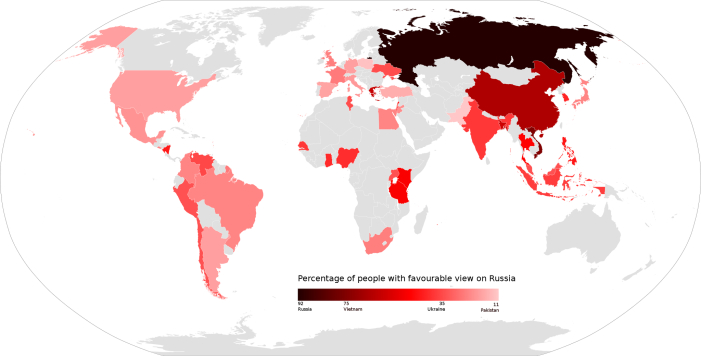Is Participating in the Sanctions against Russia a Cultural Matter?
IN FOCUS, 4 Jul 2022
Dr. PJ Peverelli | The Transnational - TRANSCEND Media Service
17 Jun 2022 – When you have been working with cross-cultural issues, helping develop a model of measurable culture using 7 cultural dimensions, you tend to develop a sensitivity for cues that seem to indicate a cultural aspect in everything that people around me say and do.
It sometimes irritates colleagues, friends and other intimi. However, some time ago one of those hunches struck me as so spectacular, that I felt I needed to share it with my larger network.
Our politicians and media remind us daily that the current turmoil in Ukraine is the most horrible issue the world has to deal with at this moment. Fortunately, Russia stands alone in its military aggression and the entire (rest of the) world is uniting in sanctions to force Russia on its knees and give up.
Other views can only be heard on LinkedIn, which has become one of the last platforms for really free and diverse debates. Several people have posted a map of that ‘entire world’ that is joining in sanctioning Russia:

Most viewers will either regard this map as horrifying or amusing, depending on their point of view.
My first look rang a bell in the back of my head, a kind of déja vue feeling. After a few seconds the fog in my head cleared up and two words appeared very clearly: Universalist – Particularist.
These terms mark the two ends of the first dimension of the 7-Dimension model of national culture developed by Fons Trompenaars. I will copy here the basic explanation of this dimension on the model’s site (I am also using it in my essay on cross-cultural human rights and on Chinese democracy posted earlier on the TFF site).
The dimension Universalist – Particularist concerns the standards by which relationships are measured.
Universalist societies are based on rules: their members tend to feel that general rules and obligations are a strong source of moral reference. They are inclined to follow the rules and look for “the one best way” of dealing equally and fairly with all cases (even when friends are involved). They assume that their standards are the right standards, and they attempt to change the attitudes of others to match theirs.
Particularist societies are predominantly based on relationships: particular circumstances that lead to exceptions are more important than rules. Bonds of exceptional relationships (family, friends) are stronger than any abstract rules, therefore the response to a situation may change according to the circumstances and the people involved. The members of particularist/relationship-based societies often argue “it all depends.”
Now look at the world map indicating the scores of each nation on this dimension.

I find the similarities striking; certainly sufficiently so to invite further research.
So far, most people discussing issues like the trade war with China, and the war in Ukraine, are doing so in terms of political alliances. I am challenging this and put it to you that the currently emerging Cold War is a cultural one, a conflict between the old West, the former colonists, that is gradually losing its dominance and the newly emerging economic and political powers, many of which are former colonies.
It is part of the still-unfinished decolonization process and, thus, the Western reaction is neocolonialist.
_________________________________________
Dr. PJ Peverelli – Assistant Professor, School of Business and Economics, Management and Organisation, Amsterdam Business Research Institute. Email: p.j.peverelli@vu.nl
Go to Original – transnational.live
Tags: Anti-imperialism, China, Cold War II, Colonialism, Hegemony, Neocolonialism, Russia, Sanctions, USA
DISCLAIMER: The statements, views and opinions expressed in pieces republished here are solely those of the authors and do not necessarily represent those of TMS. In accordance with title 17 U.S.C. section 107, this material is distributed without profit to those who have expressed a prior interest in receiving the included information for research and educational purposes. TMS has no affiliation whatsoever with the originator of this article nor is TMS endorsed or sponsored by the originator. “GO TO ORIGINAL” links are provided as a convenience to our readers and allow for verification of authenticity. However, as originating pages are often updated by their originating host sites, the versions posted may not match the versions our readers view when clicking the “GO TO ORIGINAL” links. This site contains copyrighted material the use of which has not always been specifically authorized by the copyright owner. We are making such material available in our efforts to advance understanding of environmental, political, human rights, economic, democracy, scientific, and social justice issues, etc. We believe this constitutes a ‘fair use’ of any such copyrighted material as provided for in section 107 of the US Copyright Law. In accordance with Title 17 U.S.C. Section 107, the material on this site is distributed without profit to those who have expressed a prior interest in receiving the included information for research and educational purposes. For more information go to: http://www.law.cornell.edu/uscode/17/107.shtml. If you wish to use copyrighted material from this site for purposes of your own that go beyond ‘fair use’, you must obtain permission from the copyright owner.

